Our pain can’t wait! This clear message defined the introduction to the “Policies Against Pain” conference held at the CaixaForum in Madrid on Monday, September 18, organised by the Spanish Observatory of Medicinal Cannabis “OECM”, which we attended as sponsors of the event, givins our support from the Fundació Alchimia Solidària and that we now want to share with you with this summary.

The objectives of the event, which aims to be a key information point to share knowledge about medical cannabis and expose the harsh reality experienced by patients and users, in which doctors, scientists, researchers, lawyers, sick people, media gathered of communication, users and as the main innovation of this year, political representatives of the 4 major parties of this country (PP, PSOE, Podemos and Ciudadanos), are to:
- Bring light on the therapeutic properties of cannabis.
- Review the current legal situation in which medicinal cannabis.
- Hear the views of different politicians and journalists in relation to cannabis.
- Analysis of the latest advances discovered regarding the plant.
There was a great deal of excitement and expectation leading up to this day, in which patients and experts called for the political will to regulate medicinal cannabis, with the presence of volunteers from the OECM (Spanish Observatory of Medicinal Cannabis) finalising the last details, with the desire to have everything perfect for the event.
Presentation of Policies Against Pain
At 10am the day began with a presentation by Carola Pérez, president of the OECM and founder of the association of therapeutic users Dosemociones, a patient and tireless defender of the regulation of therapeutic cannabis, supporting those patients who use cannabis for medicinal purposes.

Carola Pérez was accompanied by Manuel Guzmán (Vice President of the OECM / Professor of Biochemistry and Molecular Biology at the Complutense University of Madrid / Member of the Royal National Academy of Pharmacy), Cristina Sánchez (Secretary General of the OECM / Professor of Biochemistry and Molecular Biology at the Complutense University of Madrid) and Guillermo Velasco (Treasurer of the OECM / Doctor of Biology from the Complutense University of Madrid).
Introduction to medicinal cannabis
The first speaker was Manuel Guzmán, with an Introduction to Medicinal Cannabis. A very interesting talk in which he explained in a very understandable way the different types of cannabinoids and their therapeutic applications, both at the neurological and oncological level.
He also talked about the different medicines already on the market that already use cannabis in their composition and how the medicinal use of the plant helps different patients and how to make good use of it. His great humanity, kindness and humility were evident.
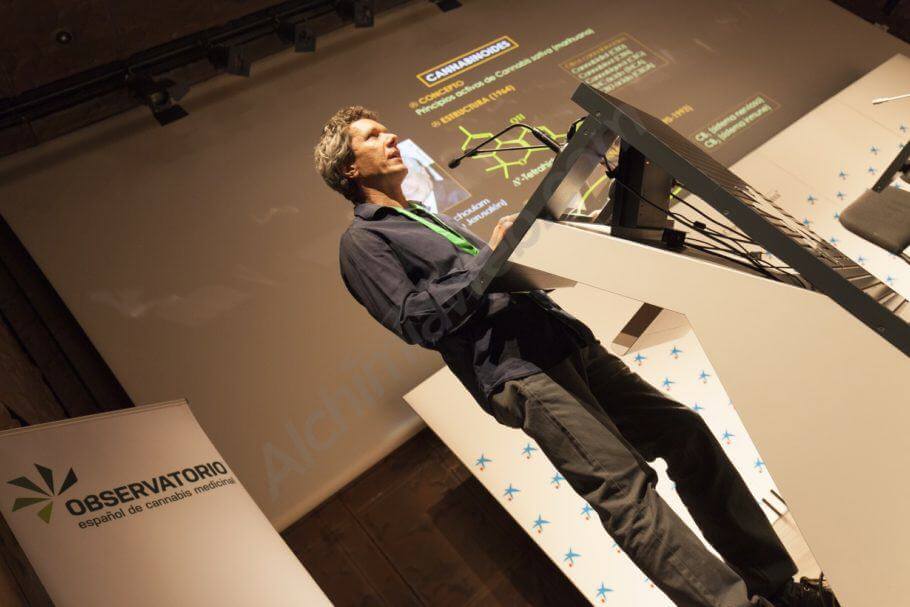
If you ever have the opportunity to attend one of their presentations, we recommend it without any doubt. Cristina Sánchez was in charge of measuring the times of the speakers, moderating the round of questions from the attendees and keeeping things moving.
Legal status of medicinal cannabis
Araceli Manjón (Professor of Criminal Law of the UCM, Magistrate of the National Court, and former Director of the Cabinet of the National Plan on Drugs) made a review of the history of the prohibition of cannabis and the urgency for its legalization. He tried to clarify the political interests and the W.H.O. and the importance of not being declared as a narcotic, and the difficulties in removing cannabis from this blacklist to be able to continue the advance both in research and regularizsation.
After a few minutes to answer questions from the audience, we continued with the next speaker, José Carlos Bouso (Psychologist and Doctor in Pharmacology / Director of scientific projects of the ICEERS Foundation).
Despite some initial technical problems, he was able to show an interactive map from on the Cannabmed website, ilustrating the status of the current situation regarding legalization in different countries of the planet, where in one way or another the proposals and projects of Regularization are already underway, and in several of which he has actively participated.

The first break of the day, in which both the participants and the speakers were able to exchange impressions in an informal way, was over a tasty breakfast. We took advantage of the rest to ask Manuel Guzmán some questions, who was very happy to respond us.
Media Table at the conference on Policies Against Pain
The role of the media in the regulation of medicinal cannabis; know the position of different politicians and journalists in relation to marijuana … Carola Pérez was responsible for moderating the debate among 4 professionals: Diego Carrasco of Diario Médico, Alfredo Pascual of El Confidencial, Josefina Giancaterino of ABC and Anna Grau, writer, journalist and collaborator with different spaces in media.
The debate focussed on the particular sensitivity that must be shown when talking about an issue as current and as uncomfortable for the majority as is medical cannabis, which means they usually fall back on the typical stigmas that drag the plant and especially its consumers down. The difficulty is for people to speak openly, without embarrassment or shame, as it’s not well looked up on by today’s society, and this both hinders free expression and limits information.
Manifesto of patients using medicinal cannabis
While María Justina Martín (Head of the Waste Analysis Division at the Public Health Laboratory of Madrid) explained to us the results of a study of cannabinoid analytics, a multitude of patients from the association terapeutic users dosemociones took on the stage.
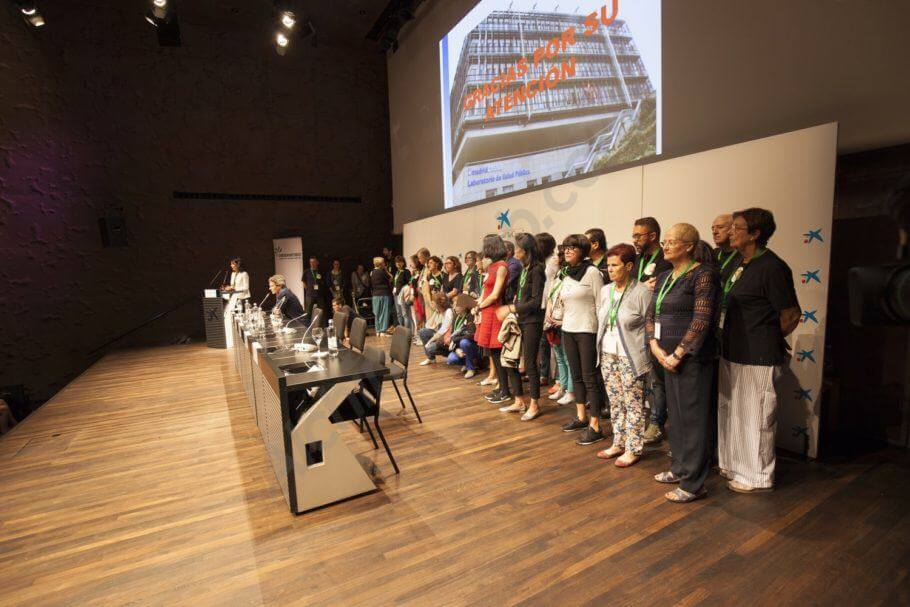
In our opinion, also with the feeling that it was shared by the rest of the attendees, these were the most emotional and hard moments of the day, with the reading of this manifesto from patients who use medicinal cannabis:
First of all we want to introduce ourselves. We are a representation of the 6 million people in Spain who suffer chronic pain and other pathologies suitable for treatement with cannabis, such as cancer, inflammatory diseases, fibromyalgia, endometriosis, refractory epilepsy.
Suffering chronic pain or one of these pathologies means, in many cases, having undergone surgery, invasive diagnostic tests and medications that at the same time a reducing pain also reduce one as a person, having left ones privacy at the door of any hospital, just to get minimal relief.
It means that we have a family that cringes with every gesture of pain that we make, that is forced to put its life to one side many times because we can’t get out of bed. It means that, with the best of luck, we have had to adapt our job to ourselves.
Among all these bad experiences we have had the gift of being part of the “Association of patients using cannabis Dosesmociones”. I assure you that in many cases arisins there was desperate, as a last resort and with the fear provoked by ignorance. But as we’ve told you, it was a gift for us and our families. Because we found a relief to the pain, an improvement to our pathology, because we’ve startged to sleep, because we have something to hold on to and fight for.
Therefore, we ask you to fight with us for the right to the right to the patients quality of life, and that of their relatives. That you help us to raise awareness of the different pathologies and to the improvement that we have experienced with therapeutic cannabis. We ask you to protect us. We feel persecuted and often isolated. Help us with the creation of a state agency that encourages regulated free access to cannabis for medicinal use.
Finally we ask for a clear and wide regulation of access to medical cannabis, to give us the possibility of accessing it through the health system like any other medicine. We also require you to establish a licensing system, where you can also access cannabis and the different derivatives and products that the pharmaceutical industry can’t provide and that are being used with very good results, in other places where cannabis is already regulated as in some US states and Canada, products such as patches, tinctures, edibles; but fundamentally we ask them to regulate the right to self-cultivation and compassionate collective cultivation.
Allow us to help each other. The current situation only gives us legal problems, health issues, much stress and more pain. Thank you for giving us the opportunity to explain our situation, our needs and some of our solutions. Please reconsider the current policy of irregularity to which the medicinal use of this substance is subject, and the place where it has left us. Hopefully and from your position help us. I hope you never have to do it on a personal level. Please remember that pain can’t wait.
Thank you very much.
After a long and emotional applause, the patients left the stage, to give way to one of the most controversial and expected parts, the presence of the political framework…
Table of Politicians participating in the day on medicinal cannabis
Araceli Manjón was in charge of moderating and formulating the questions related to the regulation of medicinal cannabis in Spain with the presence of Francisco Igea of Ciudadanos, Jesús María Fernández of the PSOE, Mae de la Concha of Podemos and María del Carmen Hernández Bento of PP .
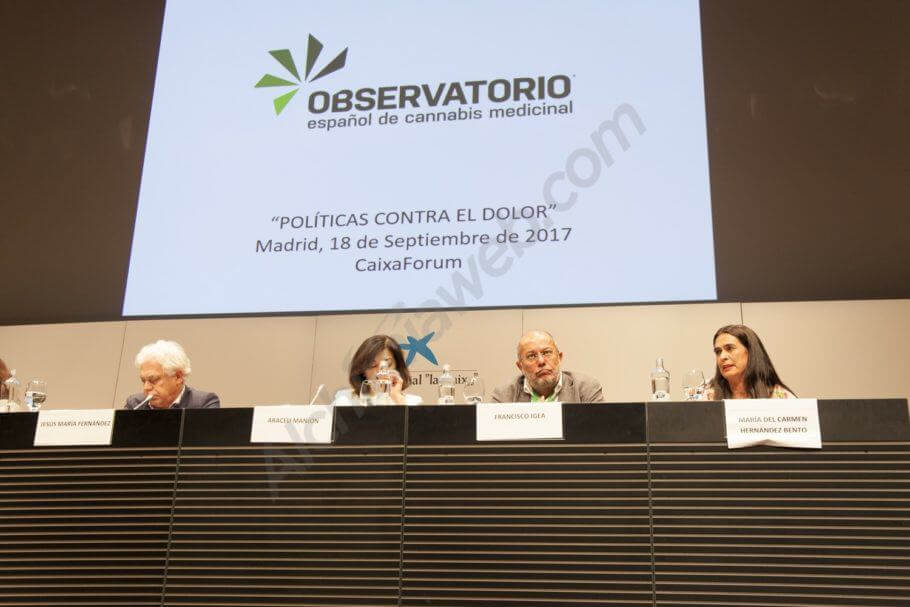
The discussion centred around the subcommittee created after the presentation of the Proposition No of Law by Ciudadanos before the Congress of Deputies, to regulate medicinal cannabis.
Francisco Igea (Ciudadanos) on behalf of his party, was the one who was most in favor of both the Regulation, as well as the research and development assistance for such Regularisation to take place.
Mae de la Concha (Podemos) showed a rebellious and protestant position. He expressed with regret his belief that this subcommittee had simply been created so that the matter would not be discussed again.
However, María del Carmen Hernández (PP) defended this subcommittee and committed herself to all those present, that she would be given the importance that this situation deserves and it will not fall on deaf ears.
On the other hand, Jesús María Fernández (PSOE), unlike what his party seems to support in different communities, was not convinced by the presentations of the professionals or the testimony of the sick. He said that there is no relevant scientific evidence and that much remains to be demonstrated. Francisco Igea (Ciudadanos), a doctor by profession, undertook to transfer to the Congress several of the questions received by the attendees, although he can’t guarantee that these will be resolved effectively.
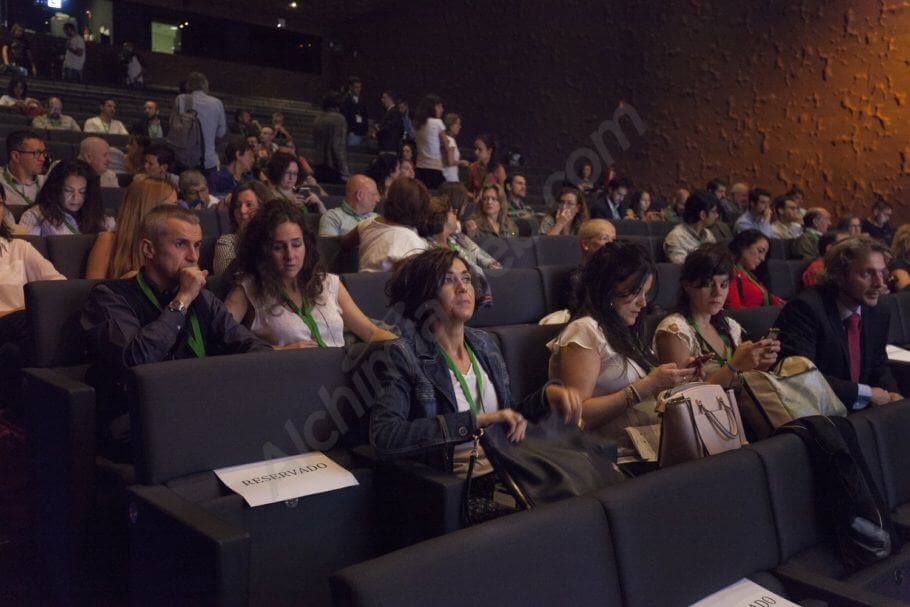
Finally, several of the testimonies of patients attending this day of “Policies Against Pain” were given. Cruel experiences, in which one of the attendees reported that the government is giving permission to a Spanish company for the production and export of cannabis abroad, but that at the same time there is a wall when regularizing Cannabis Associations, GrowShops and Home Growing… the silence on the part of the members of the table and the end of question time gave way to the lunch break.
The speakers and sponsors of this medicinal cannabis day had lunch prepared a caterers for us. While we replenished our strength in a more relaxed atmosphere, we shared some very pleasant moments with several acquaintances and friends; We chatted with Zoe from Kannabia, with Javier Pedraza (recently having become a dad) who attended the day with his wife and baby, and who also accompanied him last weekend to ExpoGrow in Irun, with Guillermo Velasco,…
Always attentive with Alchimia, Dr Mariano García de Palau kindly offered to collaborate in any event or conference on therapeutic cannabis that we organize, to remind us that we can count on his participation. Once again, Bernardo Soriano was very considerate and attentive to us, ready to facilitate the work throughout the day, with whom we already shared previous experiences, especially those of last May in the ManiFiestAcción, and that we’ll remember for a long time.
Towards the regulation of medicinal cannabis
With the batteries charged, we went back into the room to begin the afternoon with the intervention of Iñaki García (Agricultural Technical Engineer and Bachelor of Biotechnology), in which he made a brief but concise statement detailing some of the keys to make correct us of cannabis.
He was followed by Bernardo Soriano (lawyer specialised in cannabis and activist member of the Responsible Regulation platform), with a brief presentation in which he explained the news on Regularization in Spain and stressed the need to approve this Regulation, to normalise the situation of both growers and sick people, as well as their relatives.
Bernardo Soriano defended at all times the disobedience of self-cultivation, and that today we are obliged to carry out to supply users. We took this opportunity to ask him some questions, to keep us informed about the upcoming events in which we intends to participate in his initiative for the regulation of cannabis “Responsible Regulation“, which he represents.
Meeting with cannabis patients
To deal with the last block of the day “Encounter with patients”, the following speaker was introduced: Carlos Goicoechea (Biologist / Professor of Pharmacology at the Rey Juan Carlos University / Doctor in Pharmacology from the Complutense University of Madrid / Director of the Department of Sciences Basic Health of the URJC / Coordinator of the “Pain Research Excellence Group” URJC-Santander / Coordinator of the Official Master’s Degree “Study and Treatment of Pain”) gave us a wonderful explanation of how to understand PAIN: “The pain of others always seem less pain.“
He had prepared an extensive presentation; We were left hanging on every word he had to say, since he and us were cut short. We found a graph that showed us very interesting, with the unwanted effects of cannabis in the studies carried out on patients, with the economc cost of the products as the first point, followed by the concerns of the concerns of the user to not be discovered consuming, and of what they will say… the fear of the opinion of others, if they are found in possession or if the smell of cannabis is noticed.

After his speech, a discussion table was opened with the following participants;
Mariano García de Palau (Bachelor of Medicine and Surgery at the University of Barcelona), Javier Pedraza (Bachelor of Medicine and Surgery at the University of Barcelona) and Carlos Goicoechea (Professor of the Pharmacology Department of the Rey Juan Carlos University).
They spoke about the different current treatments, both palliative and curative, the medicinal alternatives proposed by cannabis in cases that they are treating themselves. They complain that there are very few professionals who openly dare to treat, advise and follow up on patients. Of the enormous benefits that the plant brings and the few negative effects of it, always advising from a point of view complementary to the treatments that patients already, perform via traditional medicinal.
At one point of the debate, Carlos Goicoechea left the table ti be replaced by Guillermo Velasco (doctor in Biology and researcher of the active principles of cannabis as antitumor agents) who told us a little about his research and continued with the interchange of views.
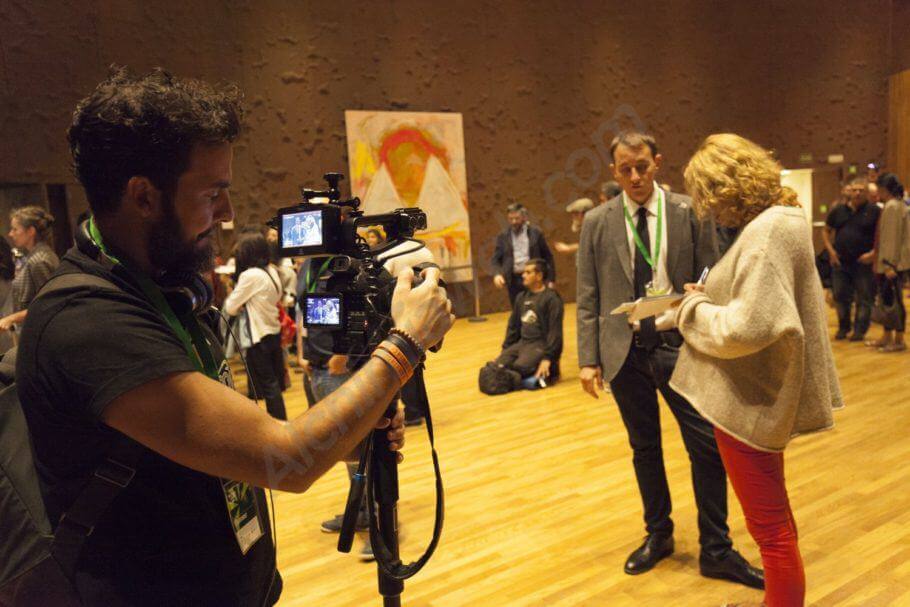
And finally, and no less fascinating, was the turn of José Antonio Martínez Orgado (Bachelor of Medicine from the Complutense University of Madrid and Doctor of Medicine from the Autonomous University of Madrid). Epilepsy, especially in children, is the most controversial treatment of today, as many parents are acting against the law to offer their children the best possible therapy.
As it is a visibly effective solution, more and more parents are opting for the option of cannabis to treat minors, with undeniably positive effects. CBD seems to be the answer to many cases of epilepsy, with no or almost no negative effects. It’s a real pity that so many families affected by this condition, which is increasingly widespread, can’t benefit.
Closing of the day of Policies Against Pain
To close this day, around 7.30pm, Carola Pérez again took the floor, visibly tired due to the recent surgery she has underwent. She was very proud of how this day had evolved and grateful to see how this year politicians have wanted to show their faces, hopeful that significant progress will occur and that in the coming years it will no longer be necessary to organise more events of this kind.
In different publications we see this phrase: “When we talk about therapeutic cannabis we are talking about health and, therefore, about dignity” (Araceli Manjón). We want to convey to you that these words were so strong that they were burned into our hearts and make the perfect summary of what those who had the opportunity to attend this day have taken away from it.



Leave a Reply